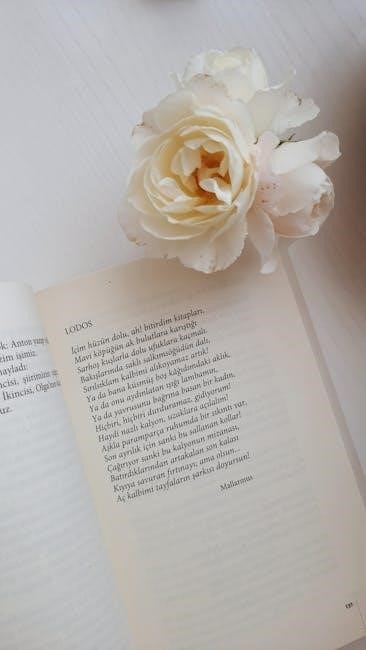The Invictus poem, written by William Ernest Henley in 1875, embodies resilience and self-mastery. Its four stanzas, crafted during Henley’s time in a tuberculosis hospital, reflect unwavering strength. The poem, available as a PDF, inspires millions with its timeless message of courage and determination.
1.1 Overview of the Poem
The Invictus poem, written by William Ernest Henley in 1875, is a powerful expression of resilience and courage. Comprising four stanzas, it captures the speaker’s unwavering spirit in the face of adversity. The poem, available as a PDF, reflects Henley’s personal struggles, including his experience with tuberculosis. Its central theme revolves around self-mastery and the unyielding human spirit. The iconic lines, “I am the master of my fate, I am the captain of my soul,” encapsulate its enduring message of strength. The poem’s concise yet profound language has made it a timeless inspiration, resonating with readers worldwide. Its availability in PDF format ensures easy access, allowing its motivational verses to be shared and cherished across generations.
1.2 Historical Significance
The Invictus poem holds profound historical significance, emerging from William Ernest Henley’s personal trials during the late 19th century. Written in 1875 while Henley was hospitalized for tuberculosis, the poem reflects the Victorian era’s societal challenges and the resilience of the human spirit. Its themes of courage and self-determination resonated deeply, making it a beacon of hope during difficult times. The poem’s influence extended beyond literature, inspiring figures like Nelson Mandela, who found solace in its words during his imprisonment. Today, the Invictus poem remains a symbol of strength, with its PDF versions widely accessed, ensuring its message continues to inspire future generations. Its enduring relevance underscores its historical importance as a literary masterpiece.
William Ernest Henley: The Author
William Ernest Henley (1849-1903) was an English poet, editor, and dramatist. He is best known for his iconic poem Invictus, written in 1875. Henley’s literary career included supporting emerging writers like Kipling and Shaw, making him a significant figure in Victorian literature.
2.1 Biography of William Ernest Henley

William Ernest Henley, born in 1849 in Gloucester, England, was a renowned English poet, critic, and editor. His early life was marked by struggles with tuberculosis, which led to the amputation of his leg. Despite this adversity, Henley pursued a career in literature, becoming a prominent figure in Victorian literary circles. He co-founded the Scots Observer and later edited the National Observer, where he championed the works of emerging writers like Rudyard Kipling, J.M. Barrie, and George Bernard Shaw. Henley’s personal resilience inspired his most famous work, Invictus, written in 1875 while he was hospitalized. The poem’s themes of courage and self-mastery have made it a timeless classic, widely admired and often shared in PDF formats for easy access and inspiration.
2.2 His Contributions to Literature
William Ernest Henley’s contributions to literature are profound and enduring. As a poet, he is best known for Invictus, a powerful expression of resilience and self-mastery. His work as an editor and critic was equally impactful, as he played a pivotal role in launching the careers of notable writers such as Rudyard Kipling, J.M. Barrie, and George Bernard Shaw. Henley’s advocacy for free verse and his innovative approach to poetry influenced the literary landscape of his time. His writings, including Invictus, continue to inspire readers worldwide, with the poem widely available in PDF formats, ensuring its accessibility and timeless appeal. Henley’s legacy endures as a champion of literary talent and a masterful poet whose words transcend generations.

Structure and Style of Invictus
The poem’s four-stanza structure, written in free verse, uses vivid imagery to convey resilience. Its PDF format preserves the original layout, enhancing readability and analysis.
3.1 The Four-Stanza Structure
The Invictus poem is divided into four stanzas, each with a distinct focus. The first stanza sets the tone, describing the speaker’s dark circumstances. The second stanza introduces themes of resilience, while the third emphasizes defiance against adversity. The final stanza, with its iconic lines, declares self-mastery. This structure, preserved in the PDF version, allows readers to follow the emotional journey seamlessly. The stanzas build upon each other, creating a powerful narrative of strength and determination. The PDF format ensures that the original layout and poetic flow are maintained, making it easy to analyze and appreciate the structure’s contribution to the poem’s impact.
3.2 Use of Free Verse and Imagery
William Ernest Henley’s Invictus is renowned for its use of free verse, which allows for a raw, emotional expression. The poem’s vivid imagery, such as “the night that covers me” and “the pit from pole to pole,” creates a stark contrast between darkness and inner light. Henley’s mastery of imagery evokes powerful emotions, drawing readers into the speaker’s journey of resilience. The free verse style enhances the poem’s authenticity, making it feel deeply personal and universal at once. These elements are preserved in the PDF version, ensuring that the poetic intensity remains intact. The imagery and free verse work together to convey themes of defiance and self-mastery, making Invictus a timeless and inspiring read.

Themes of the Poem
The poem explores themes of resilience, courage, and self-mastery, emphasizing the speaker’s unwavering spirit. These themes are central to the Invictus poem, available as a PDF.
4.1 Resilience and Courage
The Invictus poem, available as a PDF, vividly portrays resilience and courage through its vivid imagery and powerful language. Henley, writing from a tuberculosis hospital, reflects on his own struggles, creating a universal anthem of defiance. The poem’s opening lines, “Out of the night that covers me, Black as the pit from pole to pole,” set a tone of darkness, yet the speaker remains unbroken. The repeated emphasis on an “unconquerable soul” underscores the theme of resilience. Courage is not the absence of fear but the will to face adversity head-on, a message that resonates deeply with readers. This theme is central to the poem’s enduring appeal, making it a source of inspiration for millions worldwide.
4.2 Self-Mastery and Determination
The Invictus poem, available as a PDF, profoundly explores self-mastery and determination, emphasizing the speaker’s unwavering control over their destiny. The iconic lines, “I am the master of my fate, I am the captain of my soul,” encapsulate the essence of self-determination. Henley’s words reflect a steadfast resolve to navigate life’s challenges with unyielding spirit. The poem’s structure, with its four stanzas, builds a narrative of personal triumph, reinforcing the idea that true strength lies within. The speaker’s ability to remain unbroken, despite adversity, highlights the power of self-mastery. This theme resonates universally, inspiring readers to embrace their inner strength and take charge of their lives, making Invictus a timeless anthem of personal empowerment and determination.
Historical Context of Invictus
Invictus, written in 1875, reflects Henley’s experiences in a tuberculosis hospital. The Victorian era’s societal challenges and his personal struggles deeply influenced its themes of resilience and strength.
5.1 The Tuberculosis Hospital Setting
William Ernest Henley penned Invictus during his stay in a tuberculosis hospital, where he underwent grueling treatments. The poem’s themes of resilience and courage were deeply influenced by his personal struggles with the disease. Henley’s experiences in the hospital setting, marked by pain and uncertainty, are reflected in the poem’s vivid imagery and unyielding tone. The hospital became a symbol of adversity, against which Henley’s indomitable spirit emerged. This context underscores the poem’s message of triumph over suffering, resonating with readers facing their own challenges. The PDF version of Invictus captures this essence, offering a timeless reflection on strength in the face of hardship.
5.2 The Victorian Era Influence
The Victorian Era profoundly shaped Invictus, as William Ernest Henley’s experiences and writings reflected the cultural and literary norms of the time. The era’s emphasis on resilience, stoicism, and individual strength resonated deeply in the poem. Henley’s use of free verse, though unconventional for his time, aligned with the Victorian spirit of innovation and intellectual exploration. The poem’s themes of self-mastery and courage also mirrored the Victorian ideals of personal fortitude. The PDF version of Invictus captures these influences, offering a glimpse into the societal values of the late 19th century. Henley’s work became a beacon of hope, embodying the Victorian belief in overcoming adversity through determination and inner strength.

Invictus Poem PDF: Download and Access
The Invictus PDF is widely available for free download, offering easy access to William Ernest Henley’s inspiring poem. Readers can find it online or through educational platforms, ensuring timeless inspiration.
6.1 Free PDF Download Options
The Invictus poem is readily available for free download in PDF format from various online platforms. Websites offer direct links to download the poem without registration or fees. Additionally, educational sites and cultural archives provide access to the PDF version, ensuring it is easily accessible to everyone. The poem can also be downloaded as a Word document or text file for flexibility. Many platforms allow users to read it online or print it for personal use. This accessibility has made Invictus a widely shared and inspiring resource for millions worldwide.
6.2 How to Access the PDF Online
Accessing the Invictus poem in PDF format online is straightforward. Users can search for “Invictus poem PDF” on popular search engines, which directs them to various websites offering free downloads. Many educational and cultural platforms provide direct links to the PDF version, ensuring easy access. Additionally, some sites allow users to view the poem online without downloading, making it convenient for quick reading. Platforms like Google Scholar or educational repositories often host the PDF for free, ensuring accessibility to all. By visiting these sites, users can easily locate and access the Invictus poem in PDF format, enabling them to read, print, or share it as needed.
Analysis of the Poem
The Invictus poem, a masterpiece of resilience, explores themes of courage and self-determination. Its vivid imagery and structured stanzas convey strength, making it a timeless inspiration available as a PDF.
7.1 Line-by-Line Interpretation
The poem begins with, “Out of the night that covers me, Black as the pit from pole to pole,” setting a tone of darkness and adversity. The speaker acknowledges their suffering but declares, “I thank whatever gods may be For my unconquerable soul,” highlighting resilience. The second stanza describes a “bloody” circumstance but affirms the soul remains “unbowed.” The third stanza confronts the future and past, stating, “I have not winced nor cried aloud,” emphasizing courage. The final line, “I am the master of my fate, I am the captain of my soul,” underscores self-mastery. Each line reinforces the theme of triumph over adversity, making the poem a powerful expression of resilience. The Invictus poem, available as a PDF, continues to inspire readers with its timeless message.
7.2 Symbolism and Metaphors
The poem is rich in symbolism, with “night” representing adversity and “blackness” symbolizing despair. The “bloody head” metaphorically signifies suffering, while the “unconquerable soul” embodies inner strength. The “gods” symbolize higher power or fate, acknowledging their role in shaping destiny. The “menace of the years” and “punishments” metaphorically depict life’s challenges. The final lines, “I am the master of my fate, I am the captain of my soul,” use nautical imagery to symbolize self-control and determination. These symbols and metaphors create a vivid portrayal of resilience, making the poem a profound exploration of the human spirit. The Invictus poem, available as a PDF, continues to resonate with readers through its powerful imagery and enduring themes.

Cultural Impact of Invictus

The Invictus poem has inspired global audiences, resonating with its themes of resilience. Nelson Mandela drew strength from it during his imprisonment, and it remains a cultural symbol of courage, widely shared as a PDF and referenced in popular culture, motivating individuals worldwide.
8.1 Nelson Mandela and Invictus
Nelson Mandela, the former President of South Africa and anti-apartheid icon, found profound inspiration in William Ernest Henley’s Invictus. During his 27-year imprisonment on Robben Island, Mandela kept a copy of the poem, which became a source of strength and hope. The poem’s themes of resilience and self-mastery resonated deeply with Mandela’s own fight against oppression and his unwavering determination to end apartheid. Its famous lines, “I am the master of my fate, I am the captain of my soul,” encapsulated his unyielding spirit. Mandela often shared the poem with fellow prisoners, fostering a sense of unity and defiance. The Invictus poem, widely available as a PDF, continues to symbolize Mandela’s legacy and the power of literature to inspire resistance and hope in the face of adversity.
8.2 The Poem’s Role in Popular Culture

Invictus has transcended literature to become a cultural phenomenon, inspiring countless adaptations and references. Its powerful message of resilience is frequently invoked in sports, films, and music. The poem gained global attention when it was recited by Nelson Mandela during the 1995 Rugby World Cup in South Africa, symbolizing unity and hope. It has also been featured in films like Invictus (2009), starring Morgan Freeman as Mandela, further cementing its cultural significance. The poem’s iconic lines are often quoted in motivational contexts, from speeches to social media. Available as a PDF, Invictus continues to influence modern culture, reminding people of the strength found within adversity and the enduring power of the human spirit.
Why Invictus Remains Relevant
Invictus remains relevant due to its universal themes of resilience and self-mastery. Its timeless message inspires individuals across generations, making it a enduring source of strength and motivation.
9.1 Universal Themes of Strength

The Invictus poem, available as a PDF, explores universal themes of strength, resilience, and self-mastery. Its message transcends time, resonating with individuals facing adversity. The poem’s emphasis on inner fortitude and determination inspires readers to confront challenges with courage. Henley’s words remind us that true strength lies within, enabling us to overcome even the darkest circumstances. The PDF version of Invictus allows easy access to these powerful verses, making its timeless wisdom accessible to everyone. Through its enduring themes, the poem continues to empower people worldwide, reinforcing the idea that the human spirit is unconquerable.
9.2 Modern Applications of the Poem
The Invictus poem remains highly relevant today, with its themes of resilience and determination inspiring modern audiences. Its availability as a PDF makes it easily accessible for educational and motivational purposes. Teachers often use the poem in classrooms to teach students about courage and perseverance. Additionally, the poem’s message resonates in popular culture, featuring in films, sports, and personal development contexts. Many individuals download the PDF to use as a personal motivational tool, drawing strength from its powerful verses. The poem’s universal appeal ensures its continued influence, making it a timeless resource for anyone seeking inspiration in overcoming life’s challenges.

How to Use the Invictus Poem PDF
The Invictus poem PDF can be downloaded for free, offering a convenient way to access its inspiring message. It is ideal for educational purposes, personal motivation, and sharing with others to spread its themes of resilience and determination.
10.1 Educational Purposes
The Invictus poem PDF is a valuable resource for educational settings, providing students with a powerful text to analyze. Teachers can use it to teach themes like resilience, courage, and self-mastery. The PDF format allows for easy distribution and inclusion in lesson plans. Students can highlight and annotate the text, facilitating deeper understanding. Additionally, the poem’s historical context and literary style make it ideal for discussions on Victorian-era literature and the use of free verse. Educators can also incorporate the PDF into assignments, encouraging students to reflect on the poem’s relevance to their own lives. This makes the Invictus PDF a versatile tool for fostering critical thinking and emotional engagement in the classroom.
10.2 Personal Inspiration and Motivation
The Invictus poem PDF serves as a powerful tool for personal inspiration and motivation. Its themes of resilience, courage, and self-mastery resonate deeply with individuals facing challenges. Many people turn to the poem during difficult times, finding strength in its message of unwavering determination. The PDF format makes it easy to access and carry the poem, allowing readers to revisit its inspiring words whenever needed. For those seeking motivation, Invictus offers a timeless reminder of the power of the human spirit. It encourages individuals to embrace their struggles and emerge stronger, making it a cherished resource for personal growth and emotional upliftment. The poem’s accessibility in PDF ensures its enduring impact as a source of inspiration for people worldwide.

Leave a Reply
You must be logged in to post a comment.